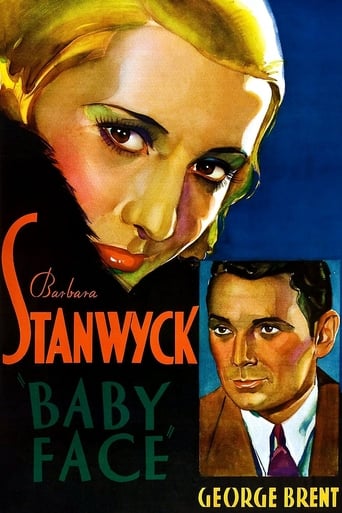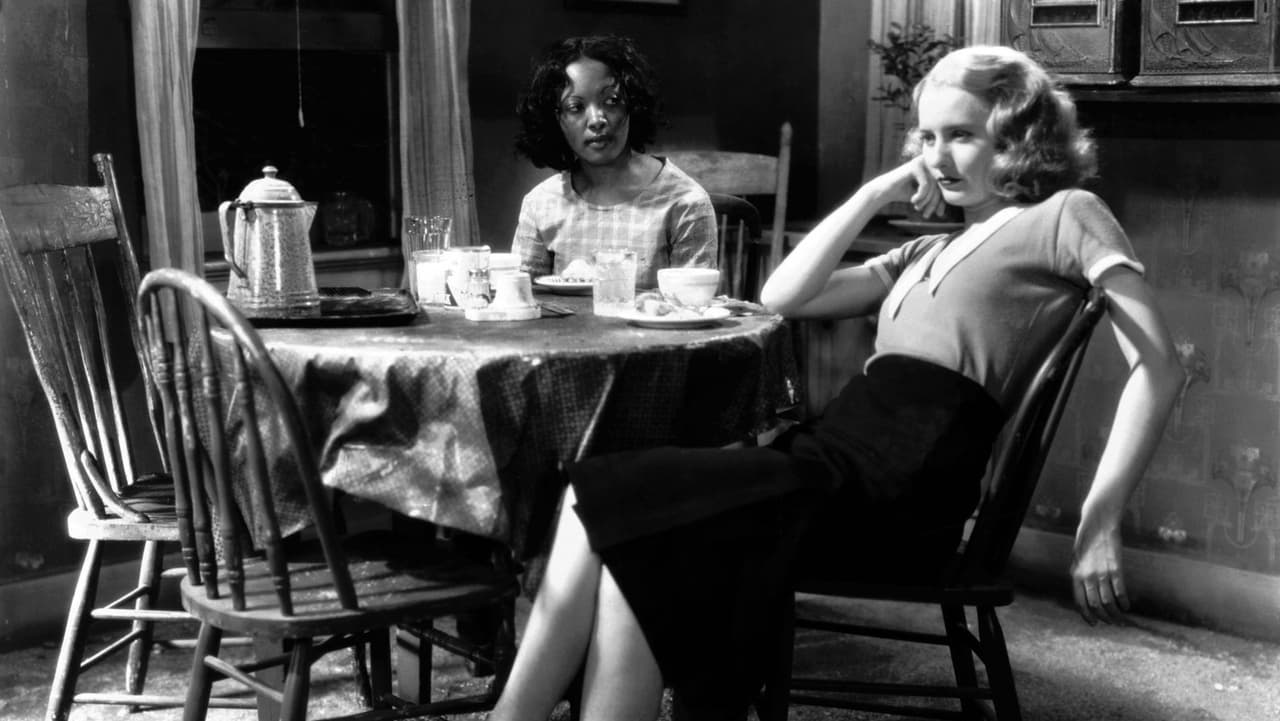allisonbazanos
This film was very different than the other films being made during the 30s. It was all about sex and a woman who was used to using her body to work her way to the top. The adventures of this woman trying to find a way in life by using questionable methods makes this movie worth watching, highly recommended.
sharky_55
To see a pre-code film like this is to have bawdiness thrown into your face, and have all your pre-conceived notions of the propriety of early Hollywood upended. Baby Face was Warner Bros' attempt to one-up MGM's Red-Headed Woman from the previous year, and both films would contribute to the hastening of the Production Code. Jean Harlow flaunted her infidelity and sexuality at every turn, openly declaring her trashy beauty with see-through dresses and a sexual thrill at being struck, but Barbara Stanwyck only needed a light caress and one look to bring men to their knees. Vice Presidents, aides and bosses walked into the room all thinking to set her straight, yet she has other ideas, and sends them on their way dazed. It is one of Stanwyck's most electric roles, made of smothering closeups and dialogue not merely laced but stinking of suggestion, and it points to her scene-stealing allure no matter the colour or style of her hair. In one particularly intoxicating scene in The Lady Eve, she lies in the lap of Henry Fonda, donning that dark, half-cut dress, and turns a screen icon into putty in her hands. The wardrobe in Baby Face similarly marks her rise from the ashes. Beginning with small-town rags and a reputation for being the town prostitute (she's slept with more men at the film's opening than in Lilian's entire crusade), she emerges from the flames of a fateful fire determined to make a name for herself. Soon she has lacy dresses of all sorts, dons frilly manes and scarfs of ridiculous proportions, and at one point, seems to have fat, furry ferret wrapped around her neck and back (it's a heavy and cumbersome thing). How has she afforded these costumes? Green never shows her truly working, but in an audacious sexual metaphor, utilises a craning shot that gradually rises from the lowly filing department all the way up to executive offices. She is sleeping her way up the corporate ladder.It was wildly progressive in other ways too. Theresa Harris plays Chico, Lily's quiet, unassuming black maid, one of the last times we would see such subtlety before the mammy character took hold. Chico remains a loyal companion throughout, gaining some frilly additions to her dress as well - Lily's insistence that Chico stay by her side while others stared uncomfortably is perhaps the single streak of goodness left in her as she ascends to the top and falls from grace. Yet even before the code censorship boards were still demanding redemption for villains such as Lily Powers, if only eventually. Comeuppance wasn't enough, she had to be beaten into submission, have sentiment reintroduced into her, and so the original script's ending of Lily ending up slaving away in a steel mill was scrapped for the romantic realisation in the ambulance. Only then could it be screened to the public; a hour of debauchery and immorality, only for the conclusion to assert the overpowering values of true love and modesty. Rediscovered in 2004 and restored to its full corruptive allure, the uncut version of Baby Face allows some insight into its intended version. Gone was a man's first consuming gaze of Stanwyck, the camera moving over her long legs, and then only reluctantly up towards her face. Audience did see that same man's shockingly forward approach in propositioning her, first by stroking her on the knee, and then coming up from behind to snatch at her breasts. What they missed was the fiery Stanwyck giving as good as she got: pouring hot coffee over the guilty hand, and then later smashing a bottle over the man's head. They wouldn't see anything as daring as that from a woman for a while afterwards.
Adventure_Claire7
A woman who was used all of her life by men now makes a decision between power and love. She started from the bottom with a couple dollars to her name and used her looks to get what she wanted to get to the top. She decided that she was not going to be used any longer, and that she was going to use them instead. Once she reaches the top and finds a man who she falls in love with, something tragic happens and she needs to give up everything she has. But is love strong enough to make her give all of her money away? The title of this film is deceiving because you think it is going to be about a sweet and innocent woman.
don2507
I recently rented this movie because I had read that it was among the controversial films, perhaps the most controversial film, of the early 1930s that so riled conventional opinion in its overt immorality that the Legion of Decency and the Hays Code were instituted soon after to remold Hollywood filmmaking to remove objectionable content from motion pictures. Lily (a very young Barbara Stanwyck) is a barmaid of easy virtue working in her father's illegal speakeasy. We see her father "give" her to a politically influential client to ensure protection from the authorities. But Lily doesn't roll over for all the guys; some guys she likes and some guys she refuses including the guy with political connections, much to her father's anger. Amid this moral squalor Lily is "mentored", of sorts, by an older gentleman with a German accent who proclaims Nietzsche as the greatest philosopher and brings her Nietzsche's books including his "Will to Power" which the tough-talking and uneducated Lily seems disinclined to read. "You must exploit others, or they will exploit you" he tells her, and the rest of the film shows her using that advice to sexually entice men to get what she wants as she climbs the ladder of wealth and privilege; a reversal from the sexual exploitation she endured under her father.Lily is apparently sexually exciting because every man she meets, and I mean every man from lechers to family men, is eager to be with her for her carnal delights, even at the risk of their families, their betrothed, and the firms they run. All the while as she uses and then drops these guys, the jewels and furs accumulate, and miraculously the "aintcha" lingo from the speakeasy days morphs into more refined language. Her motives are so transparent in this film that its almost amusing to see these guys, to use an old expression, "let the little head decide what the big head should decide" and they bear the consequences for that. But Lily doesn't. At the end of the film she's loaded with wealth and has apparently found true love, although I would be doubtful as to its permanence. The Hays code was instituted so that films would not depict the rewarding of criminal or immoral behavior as transpired in Baby Face. I would imagine a Baby Face as modified by the Hays code would show her eventually receiving retribution in the form of a STD (no, I don't think so!) or having a church steeple topple over on her.



 AD
AD





